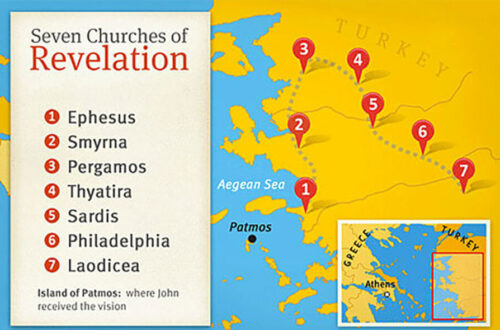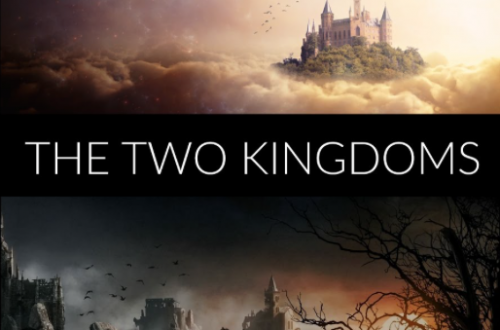A summons to faith and faithfulness
Joshua 24:1–3, 14–25 forms part of the lectionary readings for the twenty-third Sunday after Pentecost, which is November 8th. This book chronicles the way God provided for the Israelites’ entrance into the promised land.
This portion of Scripture also reveals much about the character and nature of God. Specifically, the traits of the Lord are portrayed and clarified as this book shows how God interacted with His people—leading them, protecting them, teaching them, loving them, and making a way for them to fulfill His will for their lives.
The bulk Joshua falls into two main divisions: the conquest of the land (chaps. 1–12) and the division of the land (chaps. 13–22). The final two chapters (23–24) give Joshua’s warnings and admonitions to the people of Israel, which in many ways parallel those of Moses recorded in Deuteronomy 29–30.
The Deuteronomic maxim of “obey and be blessed, or disobey and be punished” is presented clearly throughout Joshua, both in principle and in practice. Consider Israel’s military victories and defeats, which paralleled the nation’s spiritual condition.
If the Israelites remained faithful to God’s will, they defeated their enemies. Oppositely, if they compromised God’s commands and fell into sin and rebellion, or if they failed to consult the Lord, they experienced humiliating defeats.
At the time of Israel’s conquest, the superpowers of the ancient Near East had lost their grip on the land of Canaan. The Hittites had gradually faded into oblivion. Also, neither Egypt nor Babylon could maintain a military presence in the region.
Due to the absence of these military powers, the result was a series of city-states that, at best, maintained fragile alliances. The timing was optimal for Israel to enter and conquer the land.
Through the conquest of Canaan, God demonstrated to the Canaanite peoples exactly who He was. His miraculous display of power over nature put the gods and goddesses venerated by the Canaanites to shame.
Though the Creator was compassionate, He showed that He would not tolerate evil forever. Apparently, God had extended the opportunity to repent to those who were about to be conquered. Yet, so far as Joshua records, Rahab and her family were the only ones to accept God’s offer.
Joshua was the last central authority figure in Israel until the monarchy began in about 1050 BC. He had initiated the process of the Israelites’ conquest, while individual tribes were to conquer and settle the rest of the land on their own.
So, by bringing the people of Israel into the promised land, God fulfilled His pledge to Abraham. Yet, once they arrived, their ability to remain in Canaan depended on their willingness to obey the Mosaic Law and be true to the Sinaitic covenant.
Joshua had all the people and their representatives assemble “before God” (24:1) for what would be an important covenant-affirming ceremony. Also, Shechem was the locale for the events recorded in chapter 24.
This fortified city in the hill country of Ephraim in north-central Palestine was the junction for several major highways and ancient trade routes. Shechem was also a historically significant place where God had promised the land of Canaan to Abraham (Gen 12:6–7).
After a brief review of God’s faithfulness and provision through all they had experienced (Josh 24:2–13), Joshua issued a determined call for wholehearted devotion to God. Joshua described the attitude of God’s bondservants as having a “fear” (v. 14) of the Lord.
The idea of fear is actually linked with obedience and reverence (Deut 4:10; 5:29; 6:2, 13, 24). The Creator is to be held in awe like no one and nothing else, for He is the only “living God” (Josh 3:10).
Consequently, idols were worthless and must be thrown away (24:14). That Joshua even had to tell the people to put aside their idols attests to the strong magnetism of idolatry so pervasive in the land (Deut 20:16–18).
The gods and goddesses of other peoples enticed worshipers because their veneration was so often built around promiscuous relations. This was especially true of the Amorites, whose fertility cults included several sexually immoral practices.
Against the above and other such practices, Joshua called on God’s people to choose whom they would serve. Of course, the military commander exhorted them to make the correct choice, namely, to serve the Lord with integrity and loyalty (Josh 24:14).
It was a legitimate decision, because the alternatives were real and all around them. For instance, Abraham had chosen not to serve the idols of Ur “beyond the River” Euphrates and had instead committed to serving the one true God.
The preceding generation of Israelites, however, had chosen not to be wholeheartedly devoted to the Lord and had worshiped a golden calf at Mount Sinai, a pagan deity much like the ones venerated in Egypt. That was one reason why the first generation of Israelites who had escaped Egypt died without personally seeing the promised land.
During the 400 years that the Israelites were oppressed as Egyptian slaves, they probably often dabbled in the religion of their captors. The primary figures represented in the Egyptian pantheon were the Nile River and the sun.
The god of the Nile was Hapi, who was thought to have control over the agricultural forces of nature. The sun god, Amon, was thought to provide warmth, light, and ultimately life for all things. The golden calf of Mount Sinai probably was based on Apis, the sacred bull of Egypt.
The 10 plagues God inflicted upon Egypt through Moses were likely intended to mock the imaginary power of these pagan deities. Even so, the idols of the Israelites’ captivity still had a power over them that had not been extinguished during the time of Joshua.
Joshua called on his peers to make a choice. Syncretism (the blending of religions) was unacceptable for the people of Israel. After all, they had a covenant with the one true God, who refused to share His glory with any other entity, whether real or imagined.
Joshua told this new generation of Israelites to make an either-or decision. He was pressing them to either follow the Lord wholeheartedly, or to place their security in idols of wood and stone (v. 15).
Before accepting an answer from the people, Joshua told his peers that his mind was already made up. He would not place his faith in humanly-made images. God had kept all His promises to His people, and therefore, Joshua said, “As for me and my household, we will serve the Lord.” Extended families at that time usually stuck together when it came to religion, and as the head of his clan, Joshua had made their decision.
Joshua’s clear summons to faith and faithfulness is reminiscent of Moses, who also at the end of his leadership exhorted the people to “choose life” (Deut 30:19). The sensual practices of idolatry might have been alluring to the Israelites, but they were like a desert mirage.
The above highlights the deceptive effect of all forms of sin (Rom 7:11; Titus 3:3). Sin promises freedom and autonomy, but leaves us enslaved and depleted. It didn’t have to be that way for the Israelites, and it doesn’t have to be that way for us.
In response to Joshua, the Israelites declared that they had no intention of abandoning the Lord to venerate pagan deities (Josh 24:16). To do so would be apostasy, namely, the repudiation of faith in the Creator, as it was formerly confessed. Moreover, apostasy was the deliberate turning from God to follow heathen idols, or merely a life of self-worship.
From the perspective of Scripture, forsaking begins with forgetting. That’s why God placed such a premium on His people remembering Him and not forgetting what He had done in redeeming them (Deut 4:9–10; 6:12).
In a metaphorical sense, “to remember” and “to not forget” are like the positive and negative charges on a battery. When the “deeds of the Lord” (Ps 77:11) are remembered, it positively charges devotion. Likewise, the charge, “do not forget all his benefits” (103:2), warns us about the negative consequences when God is forsaken.
When the Israelites settled in Canaan, they were constantly tempted to compromise the monotheism (the belief in a single supreme being) of their ancestors. Most of the Canaanites were polytheistic, believing that many gods and goddesses coexisted peacefully as long as each was given its proper due.
Later in the Israelites’ history, various groups of among them tried to blend their faith with that of the Canaanites, and later on, with that of their captors. Yet, this process failed miserably, for the Creator refused to coexist with any other object of worship.
At Shechem, God’s people acknowledged His sovereignty in their redemptive history. He had delivered them from Egyptian bondage, protected them on their journey to the promised land, and driven out the inhabitants of Canaan before them (Josh 24:17–18).
By acknowledging God’s work on their behalf, the Israelites stated that they were ready to follow the Lord wholeheartedly. They denied any idolatrous worship, though their idols were apparently still around.
Admittedly, the Israelites’ ancestors had praised the golden calf for rescuing them from Egyptian bondage (Exod 32:4). In contrast, the present generation refused to give that credit to anyone but the Lord.
Joshua told his peers that despite what they had pledged, they were “not able to serve the Lord” (Josh 24:19). The Israelite leader wanted to fully impress upon the people that their God was “holy” and “jealous,” especially in the sense that He demanded exclusive loyalty. He was an exacting God, not to be trifled with, presumed upon, or carelessly regarded.
Joshua wanted to do more than evoke devotion for the Lord among the Israelites. The nation’s military commander also sought to properly ground their loyalty to the Creator, for He demanded such to be continuous and single-minded.
God wasn’t interested in riding the emotional tides of the Israelites, nor would He tolerate idolatrous flirtations or fads. Any “rebellion” by them would be a willful casting aside of His authority.
Concededly, all sin is willful, and a holy and jealous God would not treat any of His people’s “sins” lightly. Forsaking the Creator was certainly more costly than it ever would be to serve Him.
Joshua’s words about the Lord not forgiving “your rebellion and your sins” can be troubling to Christians. Yet, the solution is not that this was God’s manner in the Old Testament and that by New Testament times He had somehow become more forgiving and gracious. Both ideas are incorrect.
The Lord has always been a gracious and forgiving God, abounding in mercy (Exod 34:6–7; Isa 63:7), but He has also been fiercely opposed to sin (Heb 10:29–31). He even brought suffering to His own Son, who took our sin upon Himself to make possible our forgiveness (Isa 53:10; Rom 5:8–11; 2 Cor 5:21; Gal 3:13; Col 1:21–22). In the case of the Israelites, Joshua urged them to soberly consider the accountability of their actions before God, who would not trifle with their iniquities.
Joshua 24:20 sums up the peril connected with forsaking the Lord. He would turn against those who venerated foreign gods and goddesses by bringing disaster on them. The stakes were high, since the people were entering into a covenant that allowed no room for superficial whims. Concisely, the Israelites would not know God’s blessing as long as they disregarded His statutes.
Once again, Joshua’s attention-grabbing words got the desired result. The Israelites affirmed that they would not serve any other deity but the Lord (v. 21).
Joshua responded by saying that they were witnesses to their own commitment, and the people agreed (v. 22). If they ever drifted away from their commitment to the Creator, their own words would condemn them.
Then, the Israelite leader told the people to let their lives bear fruit in keeping with their commitment. Specifically, he wanted them to throw away the idols that remained in their tents.
At the risk of angering the gods and goddesses of the region, the Israelites were to express their faith in the Lord by making a complete break with their pagan past. This action would back up their apparent change in attitude.
Joshua wanted his peers to completely “turn [their] hearts to the Lord” (v. 23). As before, the people restated their commitment to God (v. 24).
The covenant that Joshua made with the people was not a new agreement. More than likely, he was simply reaffirming the binding compact Moses had established (v. 25).
Joshua recorded in writing the people’s commitment to the covenant. He also built a memorial as a reminder of their commitment (vv. 26–27). With the covenant renewed and the people’s commitment confirmed, Joshua sent the people back to their homes (v. 28).
Key ideas to contemplate
Life demands making choices. Some are relatively insignificant. Whether we have orange juice or grapefruit juice for breakfast, or wear the blue outfit or the gray one, are not momentous decisions.
Yet, deciding whether to make a lifetime commitment in marriage to a person, or choosing a career path that will not be as financially viable as other jobs—these are major choices. In light of today’s Scripture passage, consider how God summons His children to make important decisions within the context of the biggest choice of all, namely, to put the Lord first by trusting and obeying Him.
1. Chart. Joshua reminded the Israelites of what God had done for them in the past. A good starting point in making the right choices in life is to think about the Lord’s mighty acts in the past, both those recorded in Scripture and those recalled from one’s personal life.
2. Challenge. Joshua challenged the people to make a conscious, public declaration of their loyalty to God. Regardless of what we, as believers, think, say, or do, every day we are faced with the challenge of consciously deciding to exclusively serve the Lord.
3. Change. Choosing to worship and serve God means forsaking all the idols prevalent today in society. These include the following: knowledge, success, popularity, money, pleasure, power, physical attractiveness, and consumerism.
The above are just some of the many “idols” that people in our society typically venerate. Consider how difficult it is for us to replace these attractions with exclusive devotion to the Lord.
4. Charge. Joshua called upon a new generation of Israelites to renew their pledge to worship and serve the Lord. As Christians, we do the same each time we gather together to observe the Lord’s Supper. We are reminded of the new covenant that we have through faith in the Son.




